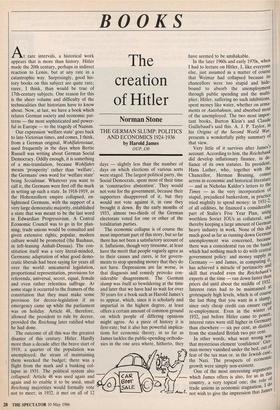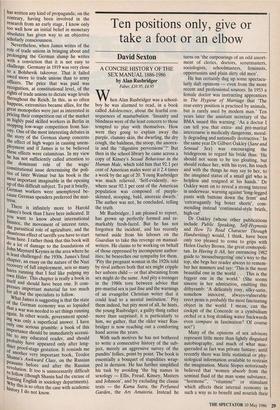BOOKS
At rare intervals, a historical work appears that is more than history. Hitler made the 20th century, perhaps in indirect reaction to Lenin, but at any rate in a catastrophic way. Surprisingly, good his- tory books on this subject are quite rare; rarer, I think, than would be true of 17th-century subjects. One reason for this is the sheer volume and difficulty of the technicalities that historians have to know about. Now, at last, we have a book which relates German society and economic pat- terns — the most sophisticated and power- ful in Europe — to the tragedy of Nazism.
Our expression 'welfare state' goes back to late-Victorian times, and comes, I think, from a German original, Wohlfahrtsstaat, used frequently in the days when Bertie Russell was writing about German Social Democracy. Oddly enough, it is something of a mis-translation, because Wohlfahrt means 'prosperity' rather than 'welfare', the Germans' own word for 'welfare state' being Sozialstaat. Whatever you want to call it, the Germans were first off the mark in setting up such a state. In 1918-1919, as the Hohenzollern empire collapsed, en- lightened Germans, with the support of a very large democratic majority, established a state that was meant to be the last word in Edwardian Progressivism. A Central Economic Council was to go in for plan- ning; trade unions would be consulted and given extensive rights; popular, modern culture would be promoted (the Bauhaus, in left-leaning Anhalt-Dessau). The con- stitution itself was a very literal-minded, Germanic adaptation of what good demo- cratic liberals had been saying for years all over the world: unicameral legislation, proportional representation, provisions for referenda, universal, secret, equal, female and even rather relentless suffrage. At some stage it occurred to the framers of the constitution that they must make some provision for decree-legislation if an emergency came up while the parliament was on holiday. Article 48, therefore, allowed the president to rule by decree, provided the Reichstag later ratified what he had done.
The outcome of all this was the greatest disaster of this century: Hitler. Hardly more than a decade after the brave start of 1919, a quarter of the population was unemployed; the strain of maintaining them wrecked the budget; there was a flight from the mark and a banking col- lapse in 1931. The political system also collapsed: Article 48 was used again and again and to enable it to be used, small Reichstag majorities would formally vote not to meet; in 1932, it met on all of 12
The creation of Hitler
Norman Stone
THE GERMAN SLUMP: POLITICS AND ECONOMICS 1924-1936 by Harold James
OUP, DO days — slightly less than the number of days on which elections of various sorts were staged. The largest political party, the Social Democrats, spent most of their time in 'constructive abstention'. They would not vote for the government, because their supporters disapproved of it, but they would not vote against it, in case they brought it down. By the early months of 1933, almost two-thirds of the German electorate voted for one or other of the totalitarian parties.
The economic collapse is of course the most important part of this story, but so far there has not been a satisfactory account of it. Inflations, though very tiresome, at least have the merit that people vaguely agree as to their causes and cures, ie for govern- ments to stop spending money that they do not have. Depressions are far worse, in that diagnosis and remedy provoke con- siderable disagreement. The German slump was itself so bewildering at the time and later that we have had to wait for over 50 years for a book such as Harold James's to appear, which, since it is scholarly and impartial in the highest degree, at least offers a certain amount of common ground on which people of differing opinions might agree. As a piece of history it is first-rate; but it also has powerful implica- tions for economic theory, in so far as James tackles the public-spending orthodo- xies in the one area where, hitherto, they have seemed to be unshakable.
In the later 1960s and early 1970s, when I had to lecture on Hitler, I, like everyone else, just assumed as a matter of course that Weimar had collapsed because its chancellors were too stupid and hide- bound to absorb the unemployment through public spending and the multi- plier; Hitler, suffering no such inhibitions, spent money like water, whether on arma- ments or Autobahnen, and absorbed most of the unemployed. The two most impor- tant books, Burton Klein's and Claude Guillebaud's said this. A. J. P. Taylor, in his Origins of the Second World War, presents a wonderfully pithy summary of that view.
Very little of it survives after James's account. According to him, the Reichs bank did develop inflationary finance, in de- fiance of its own statutes. Its president, Hans Luther, who, together with the Chancellor, Herman Bruning, comes across in economic and historical literature and in Nicholas Kaldor's letters to the Times — as the very incorporation .01 stupid, prejudiced bankerdom, in practice tried mightily to spend money: in 1931-2, of all oddities, he financed a considerable part of Stalin's Five Year Plan, using worthless Soviet IOUs as collateral, and thereby keeping a large amount of Ger1flan. heavy industry in work. None of this did much good as far as running down German unemployment was concerned, because there was a coincidental run on the banks which had nothing much to do with central government policy: and money supply r Germany — and James, in computing it; has achieved a miracle of pertinacity attl skill that evaded even the Reichsbank s experts at the time — ran down faster than prices did until about the middle of 1932. Interest rates had to be maintained at grotesquely high levels, which is of course the last thing that you want in a slump; since only cheap credit can ensure rap10, re-employment. Even in the winter 01 1932, just before Hitler came to power, interest rates were still higher in GermanY than elsewhere — six per cent, as distinct from the standard British two per cent. In other words, what went wrong was that mysterious element 'confidence'. Ger; man money vanished under the bed, out 0' fear of the tax man or, in the Jewish case. , the Nazi. The prospects of economic growth were simply non-existent. nts One of the most interesting argurne which James offers is also, for us in this country, a very topical one; the role (,)! trade unions in economic stagnation. I au.. not wish to give the impression that Janie' has written any kind of propaganda; on the contrary, having been involved in the research from an early stage, I know only too well how an initial belief in monetary absolutes has given way to an objective scholarly consciousness. Nevertheless, when James writes of the role of trade unions in bringing about and Prolonging the German slump he writes with a conviction that it is not easy to challenge. Germany in 1919 was very close to a Bolshevik takeover. That it failed owed more to trade unions than to army Officers. The price that was paid was recognition, at constitutional level, of the rights of trade unions to dictate wage levels throughout the Reich. In this, as so often happens, extremities became allies, for the great monopolies were just as interested in Pricing their competition out of the market as highly paid skilled workers in Berlin in stopping low-wage competition from Sax- Oily. One of the most interesting debates in the story of the German slump concerns the effect of high wages in causing unem- ployment and if James is to be believed these effects were calamitous. In my view he has not sufficiently called attention to the dominant role of the wage/ constitutional issue determining the poli- tics of later Weimar but his book is the most important imaginable in the opening Up of this difficult subject. To put it briefly, German workers were unemployed be- cause German spenders preferred the mat- tress.
There is infinitely more to Harold James's book than I have here indicated. If You want to know about international finance, the movement of interest rates, the parasitical role of agriculture, and the disastrous effect of tarriffs you have to start from here. I rather think that this book will do a lot of damage to the foundations of John Maynard Keynes in the area where he is least challenged: the 1930s. James's final Chapter, an essay on the nature of the Nazi recovery of full employment, sets so many hares running that I feel like pulping my °. wn Hitler. This chapter is really a book in Itself and should have been one. It com- presses important material far too much for all but the specialists to follow. What James is suggesting is that the state of the German economy was so lopsided that a war was needed to set things running again. In other words, government spend- mg was only a superficial answer. I have Only one serious grumble: a book of this 2r1Portance should be immediately accessi- ble to any educated reader, and should Probably have appeared only after leng- thier proof-stage gestation. It reminds me of another very important book, Teodor Shallin's Awkward Class, on the Russian Peasants before and after the Russian revolution. It too is unnecessarily difficult _to follow (though Shanin had the excuse of 1–earning English in sociology departments). ,w. hy this is so often the case with academic nisto.1 I do not know.



























































 Previous page
Previous page